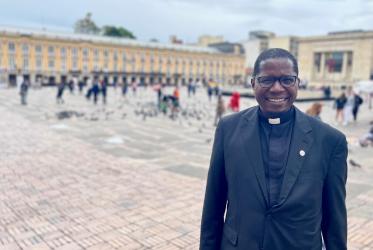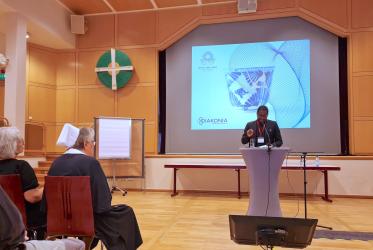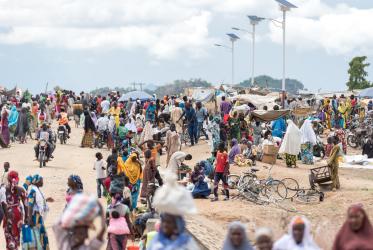Ecumenical Institute, Bossey 4-5 February 2005
Final statement
Convened by the World Council of Churches, we came together as people from a variety of ecumenical backgrounds to seek ways of increasing our effectiveness in relief and development.
We were moved by the positive spirit of all participants in this meeting and by the openness of WCC which made it possible to work collaboratively in proposing concrete ways of moving forward. We affirm the central role of the World Council of Churches in this process and we acknowledge the inter-relationship between strengthening collaboration in ecumenical relief and development and discussions taking place around "reconfiguration." While this consultation is not a decision-making body, we are committed to moving forward together.
We also acknowledge that this meeting has built on a 5+ year process of discussions regarding closer collaboration between agencies engaged in ecumenical relief and development, including the Ecumenical Partners Survey and the process leading to the proposal to create a Global Coalition of Ecumenical Relief and Development Organisations.
Together we recognise and affirm the need to establish a new alliance for churches and church-related organisations who work ecumenically in relief and development. This new alliance, provisionally called ACT Global,' is intended to address the needs identified by participants.
Specifically, we seek to increase our effectiveness in addressing issues of poverty and injustice through increased coordination at the global level and on the ground, increased visibility for the ecumenical family, mutual accountability, an integrated approach to relief and development, harmonizing policies and requirements of Northern agencies, collaboration in joint fundraising, and building local capacity. Strengthening ecumenical relationships and ensuring that our work is rooted in the churches is central to all of our work.
Some of these needs require the formation of a new ecumenical instrument, while others can be met through existing or enhancing existing ecumenical organisations.
We agreed that in the long term, the ideal model is to bring together ecumenical work with emergencies, advocacy and development under a common umbrella with a common brand name, preferably Action by Churches Together. We would like to see this happen within the next three years.
While acknowledging that it will take time to develop this proposal further and to be communicated more broadly, we insist that the need for a new alliance is urgent.
With this broader goal in mind, we suggest the following:
- That a provisional ACT Global' (with the agreement of current ACT governance structures) be established by the end of this year;
- That WCC facilitate a process leading up to this formation, including taking the following steps in the next six months:
- convening a steering group (identified below) with ex-officio participation of Action by Churches Together (ACT), the Ecumenical Advocacy Alliance (EAA), and the Ecumenical HIV/AIDS Initiative in Africa (EHAIA) to accompany and support this process;
- providing a forum for evaluating the experiences of ACT, EAA and EHAIA;
- engaging in discussions with ACT governance about the use of the name ACT;
- finalising a statement of values and principles, criteria for membership, code of good practice and other necessary founding documents;
- encouraging initial steps such as sharing plans between existing ecumenical organizations (e.g. ACT, EAA, the Ecumenical Church Loan Fund (ECLOF), and WCC) including meeting dates, common fiscal year and common planning processes;
- suggesting ways that existing instruments can be changed or enhanced to meet identified needs;
- developing a provisional structure for the interim ACT Global' and ways of working, including a way of launching the initiative;
- establishing dates and time-lines for exploring the longer-term goal to bring together ecumenical work in advocacy, relief and development.
- establishing at least two pilot projects, including
- the post-tsunami regional development programme (in consultation and with the support of ACT)
- a second initiative to be developed by the Steering Group. (Suggestions included a programme in the Great Lakes region of Africa, poverty in Africa, advocacy issues around the Millennium Development Goals or Poverty Reduction Strategy Papers (PRSPs), or an EHAIA-type model' in another region.)
Recognising that WCC will need additional capacity to carry forward this process, a number of organisations present at the meeting agreed to provide the necessary support for one year on the basis of a budget to be developed and circulated.
The Steering Group will be made up of: Baffour Amoa (FECCIWA-Ghana), Noemí Espinoza (CCD-Honduras), Cornelia Füllkrug-Weitzel (Bread for the World-Germany), Leonid Kishkovsky (OCA-USA), and Daleep Mukarji (Christian Aid-UK) with Beth Ferris (WCC) as convenor. The Steering Group may coopt additional members and/or invite resource persons as needed.
A small group was also identified to develop a statement on vision and values, including Margareta Grape (Church of Sweden-convenor), Johanta Adhikari (CCDB-Bangladesh) Margareta Nelyubova (Russia Round Table), and Atle Sommerfeldt (NCA-Norway), with consultation with other individuals and organisations as appropriate.
Next Steps:
- consult with constituencies and governance structures within our own organisations as appropriate as well as with the participants of the Global Coalition;
- secure the necessary resources and staffing to make this happen;
- communicate with and engage organisations not present at this meeting;
- ask ACT for space on their next Emergency Committee meeting to discuss issues of collaboration, name, and other issues;
- inform/consult other networks and bodies within the ecumenical family including the WCC Roundtable, regional organisations and others.
List of participants:
1. ACT Action by Churches Together - Ms Jenny Borden
2. Bread for the World - Ms Cornelia Füllkrug-Weitzel
3. Comision de Accion Social Menonita - Mr Nelson Garcia Lobo
4. Christian Care - Rev Forbes Matonga
5. Christian Commission for Development - Ms Noemi Espinoza
6. Christian Commission for Development in Bangladesh - Mr. Joyantha Adhikari
7. Christian Church (Disciples of Christ) - Rev. Eunice Santana
8. Conference of European Churches - Dr. Rev Eva-Sibylle Vogel-Mfato
9. Churches Health Association Zambia - Dr. Godfrey Biemba
10. Christian Aid - Dr. Daleep Mukarji
11. Church of Sweden - Rev. Christer Akesson
12. Church of Sweden - Ms Margaret Grape
13. Dan Church Aid - Ms Elsebeth Krogh
14. Dan Church Aid - Mr Klaus Løkkegaard
15. Ecumenical Advocacy Alliance - Ms Linda Hartke
16. Evangelischer Entwicklungsdienst (EED) - Mr Wilfried Steen
18. FinnChurchAid - Mr Antti Pentikainen
19. Fellowship of Churches and Christian Councils in West Africa - Mr Baffour Amoa
20. Global Coalition Consultant - Ms Jill Hawkey
21. Lutheran World Relief - Ms Kathryn Wolford
22. Lutheran World Service Mr Robert Granke
23. Middle East Council of Churches - Mr Guirgiuis Saleh
24. Norwegian Church Aid - Mr Atle Sommerfeldt
25. National Council of Churches of Burundi - Bishop Bernard Ntahoturi
26. Orthodox Church in America - V. Rev. Leonid Kishkovsky
27. Primate's World Relief and Development Fund - Ms Zaida Bastos
28. Russian Orthodox Round Table - Margarita Nelyubova
29. United Church of Canada - Ms Wendy Gichuru
WCC Staff
30. Rev. Dr Samuel Kobia
31. Mr Georges Lemopolous
32. Ms Genevieve Jacques
33. Dr William Temu
34. Rev. Sabine Udodesku
35. Dr Elizabeth Ferris
Ecumenical Institute, Bossey 4-5 February 2005
Final statement
Convened by the World Council of Churches, we came together as people from a variety of ecumenical backgrounds to seek ways of increasing our effectiveness in relief and development.
We were moved by the positive spirit of all participants in this meeting and by the openness of WCC which made it possible to work collaboratively in proposing concrete ways of moving forward. We affirm the central role of the World Council of Churches in this process and we acknowledge the inter-relationship between strengthening collaboration in ecumenical relief and development and discussions taking place around "reconfiguration." While this consultation is not a decision-making body, we are committed to moving forward together.
We also acknowledge that this meeting has built on a 5+ year process of discussions regarding closer collaboration between agencies engaged in ecumenical relief and development, including the Ecumenical Partners Survey and the process leading to the proposal to create a Global Coalition of Ecumenical Relief and Development Organisations.
Together we recognise and affirm the need to establish a new alliance for churches and church-related organisations who work ecumenically in relief and development. This new alliance, provisionally called ACT Global,' is intended to address the needs identified by participants.
Specifically, we seek to increase our effectiveness in addressing issues of poverty and injustice through increased coordination at the global level and on the ground, increased visibility for the ecumenical family, mutual accountability, an integrated approach to relief and development, harmonizing policies and requirements of Northern agencies, collaboration in joint fundraising, and building local capacity. Strengthening ecumenical relationships and ensuring that our work is rooted in the churches is central to all of our work.
Some of these needs require the formation of a new ecumenical instrument, while others can be met through existing or enhancing existing ecumenical organisations.
We agreed that in the long term, the ideal model is to bring together ecumenical work with emergencies, advocacy and development under a common umbrella with a common brand name, preferably Action by Churches Together. We would like to see this happen within the next three years.
While acknowledging that it will take time to develop this proposal further and to be communicated more broadly, we insist that the need for a new alliance is urgent.
With this broader goal in mind, we suggest the following:
- That a provisional ACT Global' (with the agreement of current ACT governance structures) be established by the end of this year;
- That WCC facilitate a process leading up to this formation, including taking the following steps in the next six months:
- convening a steering group (identified below) with ex-officio participation of Action by Churches Together (ACT), the Ecumenical Advocacy Alliance (EAA), and the Ecumenical HIV/AIDS Initiative in Africa (EHAIA) to accompany and support this process;
- providing a forum for evaluating the experiences of ACT, EAA and EHAIA;
- engaging in discussions with ACT governance about the use of the name ACT;
- finalising a statement of values and principles, criteria for membership, code of good practice and other necessary founding documents;
- encouraging initial steps such as sharing plans between existing ecumenical organizations (e.g. ACT, EAA, the Ecumenical Church Loan Fund (ECLOF), and WCC) including meeting dates, common fiscal year and common planning processes;
- suggesting ways that existing instruments can be changed or enhanced to meet identified needs;
- developing a provisional structure for the interim ACT Global' and ways of working, including a way of launching the initiative;
- establishing dates and time-lines for exploring the longer-term goal to bring together ecumenical work in advocacy, relief and development.
- establishing at least two pilot projects, including
- the post-tsunami regional development programme (in consultation and with the support of ACT)
- a second initiative to be developed by the Steering Group. (Suggestions included a programme in the Great Lakes region of Africa, poverty in Africa, advocacy issues around the Millennium Development Goals or Poverty Reduction Strategy Papers (PRSPs), or an EHAIA-type model' in another region.)
Recognising that WCC will need additional capacity to carry forward this process, a number of organisations present at the meeting agreed to provide the necessary support for one year on the basis of a budget to be developed and circulated.
The Steering Group will be made up of: Baffour Amoa (FECCIWA-Ghana), Noemí Espinoza (CCD-Honduras), Cornelia Füllkrug-Weitzel (Bread for the World-Germany), Leonid Kishkovsky (OCA-USA), and Daleep Mukarji (Christian Aid-UK) with Beth Ferris (WCC) as convenor. The Steering Group may coopt additional members and/or invite resource persons as needed.
A small group was also identified to develop a statement on vision and values, including Margareta Grape (Church of Sweden-convenor), Johanta Adhikari (CCDB-Bangladesh) Margareta Nelyubova (Russia Round Table), and Atle Sommerfeldt (NCA-Norway), with consultation with other individuals and organisations as appropriate.
Next Steps:
- consult with constituencies and governance structures within our own organisations as appropriate as well as with the participants of the Global Coalition;
- secure the necessary resources and staffing to make this happen;
- communicate with and engage organisations not present at this meeting;
- ask ACT for space on their next Emergency Committee meeting to discuss issues of collaboration, name, and other issues;
- inform/consult other networks and bodies within the ecumenical family including the WCC Roundtable, regional organisations and others.
List of participants:
1. ACT Action by Churches Together - Ms Jenny Borden
2. Bread for the World - Ms Cornelia Füllkrug-Weitzel
3. Comision de Accion Social Menonita - Mr Nelson Garcia Lobo
4. Christian Care - Rev Forbes Matonga
5. Christian Commission for Development - Ms Noemi Espinoza
6. Christian Commission for Development in Bangladesh - Mr. Joyantha Adhikari
7. Christian Church (Disciples of Christ) - Rev. Eunice Santana
8. Conference of European Churches - Dr. Rev Eva-Sibylle Vogel-Mfato
9. Churches Health Association Zambia - Dr. Godfrey Biemba
10. Christian Aid - Dr. Daleep Mukarji
11. Church of Sweden - Rev. Christer Akesson
12. Church of Sweden - Ms Margaret Grape
13. Dan Church Aid - Ms Elsebeth Krogh
14. Dan Church Aid - Mr Klaus Løkkegaard
15. Ecumenical Advocacy Alliance - Ms Linda Hartke
16. Evangelischer Entwicklungsdienst (EED) - Mr Wilfried Steen
18. FinnChurchAid - Mr Antti Pentikainen
19. Fellowship of Churches and Christian Councils in West Africa - Mr Baffour Amoa
20. Global Coalition Consultant - Ms Jill Hawkey
21. Lutheran World Relief - Ms Kathryn Wolford
22. Lutheran World Service Mr Robert Granke
23. Middle East Council of Churches - Mr Guirgiuis Saleh
24. Norwegian Church Aid - Mr Atle Sommerfeldt
25. National Council of Churches of Burundi - Bishop Bernard Ntahoturi
26. Orthodox Church in America - V. Rev. Leonid Kishkovsky
27. Primate's World Relief and Development Fund - Ms Zaida Bastos
28. Russian Orthodox Round Table - Margarita Nelyubova
29. United Church of Canada - Ms Wendy Gichuru
WCC Staff
30. Rev. Dr Samuel Kobia
31. Mr Georges Lemopolous
32. Ms Genevieve Jacques
33. Dr William Temu
34. Rev. Sabine Udodesku
35. Dr Elizabeth Ferris



